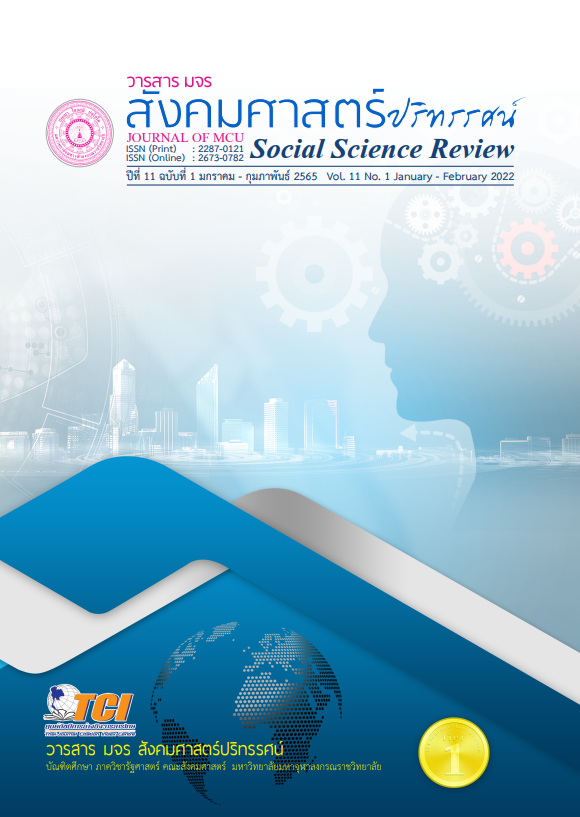มู้กส์บทเรียนออนไลน์: การให้ที่ไม่มีสิ้นสุด
คำสำคัญ:
มู้กส์, บทเรียนออนไลน์, การให้ที่ไม่สิ้นสุดบทคัดย่อ
ชีวิตคือการเรียนรู้ที่ไม่สิ้นสุด การเรียนรู้และการเรียนก็ไม่ได้จำกัดว่าต้องเรียนที่โรงเรียนเท่านั้น อีกหนึ่งทางเลือกของแหล่งเรียนรู้ที่จะช่วยขยายขอบเขตความรู้ และพัฒนาความสามารถ มู้กส์ (MOOCs) บทเรียนออนไลน์แบบเปิด (Massive open online course) การศึกษา ที่ผู้เรียนสามารถพัฒนาจิตสำนึก ในการค้นคว้าหาความรู้ตลอดเวลา ตลอดชีวิต เป็นการเรียนแบบเสรี ไม่เสียค่าใช้จ่าย สามารถเข้าถึงสถานศึกษาที่มีชื่อเสียงได้ด้วยค่าใช้จ่ายที่ต่ำมาก ลดความเหลื่อมล้ำทางการศึกษา เป็นสังคมแบบย่อส่วน เป็นการศึกษาแบบไร้ขีดจำกัด ภายใต้ความสามารถของเทคโนโลยี ในด้านของพุทธศาสนาเชื่อว่าศักยภาพของมนุษย์บวกกับ ความปรารถนาของการให้ที่ไม่มีสิ้นสุด ได้จัดทำมู้กส์ (MOOCs) บทเรียนออนไลน์ เพื่อการเรียนรู้อย่างจริงจัง และพัฒนาอย่างต่อเนื่อง แม้มีอุปสรรคจากผู้เรียน ผู้สอน ข้อจำกัดเทคโนโลยี เพื่อให้มู้กส์ (MOOCs) บทเรียนออนไลน์ สามารถนำพาให้เพื่อนร่วมโลกได้เรียนรู้ได้อย่างไร้ขีดจำกัดอย่างไม่มีที่สิ้นสุดได้กระทำให้สำเร็จ ผลของการให้ที่ไม่สิ้นสุดนี้ทำให้ผู้จัดทำมีความสุขใจ ผู้เรียนก็สามารถศึกษาแบบไร้ขีดจำกัดพัฒนาตัวเองตลอดชีวิตอย่างมีความสุข
เอกสารอ้างอิง
กระทรวงการอุดมศึกษาวิทยาศาสตร์ วิจัยและนวตกรรม. (2563). MOOCs: นวัตกรรมการศึกษา/เทคโนโลยีการสื่อสารเพื่อการศึกษาแบบก้าวกระโดด. สืบค้น 10 พฤษภาคม 2564, จาก https://www.nstda.or.th/home/knowledge_post /moocs-bibliometric/
กฤติยา ถ้ำทอง และคณะ. (2562). ทาน : วิถีแห่งพระโพธิสัตว์ในพระพุทธศาสนาเถรวาท. วารสาร มจร พุทธปัญญาปริทรรศน์, 4(3), 505-516.
กลุ่มสาระการเรียนรู้การงานอาชีพและเทคโนโลยี. (2563). MooC คืออะไรและแตกต่างกับ E-Learning อย่างไร. สืบค้น 12 กรกฎาคม 2564, จาก https://ammiitawyai.wordpress.com/2016/03/21/mooc%9A-e-learning/)
คณะกรรมการแลกเปลี่ยนเรียนรู้ผ่าน Massive Open Online Course (MOOCs). (2558). เอกสารประกอบการประชุมสัมมนาทางวิชาการ เรื่อง การแลกเปลี่ยนเรียนรู้ผ่าน Massive Open Online Course (MOOCs) วันที่ 19 – 20 พฤษภาคม 2558. นนทบุรี: มหาวิทยาลัยสุโขทัยธรรมาธิราช.
จินตวีร์ คล้ายสังข์. (2556). MOOCs PEDAGOGY: จาก OER สู่ MOOCs เครื่องมือเพื่อการเรียนรู้สำหรับผู้เรียนยุคดิจิทัล. กรุงเทพฯ: การประชุมทางวิชาการระดับชาติด้านอีเลิร์นนิง ประจำปี พ.ศ. 2556.
จิราภรณ์ ไทยนกเทศ. (2555). บทเรียนออนไลน์ วันพฤหัสบดีที่ 27 กันยายน พ.ศ. 2555. สืบค้น12 กรกฎาคม 2564, จาก http://krujiraporn2555.blogspot.com/2012/09/blog-post_27.html
เฉลิมกุล. (2559). ความหมายของการให้. สืบค้น12 กรกฎาคม 2564, จาก https://storylog.co/story/569b9e1edb1b8203754f8e9e
ชโรชีนีย์ ชัยมินทร์. (2562). MOOC: เพื่อการเรียนรู้ตลอดชีวิตในศตวรรษที่ 21. วารสารมนุษยศาสตร์และสังคมศาสตร์มหาวิทยาลัยราชภัฏเชียงใหม่, 1(1), 46-70.
ธงชัย รัตนเรืองยศ. (2564). 10 ประโยชน์ของการให้ ที่ดีต่อใจเหนือความคาดคิด. สืบค้น 12 กรกฎาคม 2564, จาก https://faithandbacon.com/benefits-of-giving/
นิตยา เปล่งเจริญศิริชัย และทรงวุฒิ ศรีรัตนมงคล. (2560). เทคโนโลยี MOOCs กับการศึกษาออนไลน์. วารสารมหาวิทยาลัยคริสเตียน, 23(3), 521-531.
เบญญศิกานต์ กาญจนาธนเสฏฐ์ และชัยยุทธ ชิโนกุล. (2564). การศึกษากลวิธีการเรียนรู้ออนไลน์ระบบเปิด (MOOCs) ของคนเจนเนอเรชั่นวาย (Generation Y) ในเขตกรุงเทพมหานคร. วารสารวิชาการธรรมทรรศน์, 21(2), 1-13.
ปริญญา น้อยดอนไพร. (2551). MOOCS (มู้กส์). สืบค้น 26 กรกฎาคม 2564, จาก https://arit.sru.ac.th/th/news-activities/arit-share/751-moocs.html
พระครูพิลาศสรกิจ (สุรศักดิ์ ธารายศ) และคณะ. ศึกษาวิเคราะห์การให้ทานในสังคมไทยยุคปัจจุบัน. วารสารมหาจุฬานาครทรรศน์, 6(5), 2302-2315.
พุทธทาสภิกขุ. (2548). ทาน ทำอย่างไรจึงจะได้บุญมาก (พิมพ์ครั้งที่ 2). กรุงเทพฯ: สำนักพิมพ์ สุขภาพใจ.
ภาสกร ใหลสกุล. (2559). MOOC มุกใหม่ของอีเลิร์นนิง. สืบค้น 12 กรกฎาคม 2564, จาก http://examplewordprewwcpm20163.
สิริลักษณ์ รัตนากร. (2561). รู้จัก “MOOC” มหาวิทยาลัยออนไลน์ เรียนได้ทั่วโลกการศึกษา. สืบค้น 10 พฤษภาคม 2564, จาก https://workpointtoday.com/% A2/
LIFEHACKK. (2021). ข้อดีและข้อเสียของหลักสูตรออนไลน์แบบเปิดกว้าง. สืบค้น 12 กรกฎาคม 2564, จาก https://th.lifehackk.com/15-the-pros-and-cons-of-moocs-31030-7905
ดาวน์โหลด
เผยแพร่แล้ว
รูปแบบการอ้างอิง
ฉบับ
ประเภทบทความ
สัญญาอนุญาต
ลิขสิทธิ์ (c) 2022 วารสาร มจร สังคมศาสตร์ปริทรรศน์

อนุญาตภายใต้เงื่อนไข Creative Commons Attribution-NonCommercial-NoDerivatives 4.0 International License.
เพื่อให้เป็นไปตามกฎหมายลิขสิทธิ์ ผู้นิพนธ์ทุกท่านต้องลงลายมือชื่อในแบบฟอร์มใบมอบลิขสิทธิ์บทความให้แก่วารสารฯ พร้อมกับบทความต้นฉบับที่ได้แก้ไขครั้งสุดท้าย นอกจากนี้ ผู้นิพนธ์ทุกท่านต้องยืนยันว่าบทความต้นฉบับที่ส่งมาตีพิมพ์นั้น ได้ส่งมาตีพิมพ์เฉพาะในวารสาร มจร สังคมศาสตร์ปริทรรศน์ เพียงแห่งเดียวเท่านั้น หากมีการใช้ภาพหรือตารางหรือเนื้อหาอื่นๆ ของผู้นิพนธ์อื่นที่ปรากฏในสิ่งตีพิมพ์อื่นมาแล้ว ผู้นิพนธ์ต้องขออนุญาตเจ้าของลิขสิทธิ์ก่อน พร้อมทั้งแสดงหนังสือที่ได้รับการยินยอมต่อบรรณาธิการ ก่อนที่บทความจะได้รับการตีพิมพ์ หากไม่เป็นไปตามข้อกำหนดเบื้องต้น ทางวารสารจะถอดบทความของท่านออกโดยไม่มีข้อยกเว้นใดๆ ทั้งสิ้น





